Recently in Statistical lunacy Category
So, how was the year? Pretty wild, if you ask me.
Good new games (2007-2008 games)
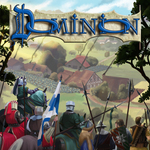
Dominion - Well, I played 28 games of this, and most of them outside BrettSpielWelt. That's a pretty nice number, considering how late this game arrived. Everybody likes it, or at least doesn't mind playing a game. Dominion is also really easy to teach and once everybody knows it, moves fast. That is, it's almost perfect for board game club environment.
I do believe it's possible to get really bored of it, but so far it's definitely one of the real highlights of the year and since it's so easy to teach, I expect it'll keep value. Besides, I quite like playing it, I like quick turns and games that move along swiftly and there are definitely interesting decisions in the game. Based on some of the comments, I think avoiding excessive play on BSW might be a key to enjoying Dominion in the future as well.
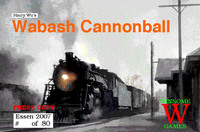
Wabash Cannonball - Game of the year, sorts of. This was a major hit in Spring when I got my copy. Our group had the most vocal fans of the game, it's interesting to see how the game will be received now the Chicago Express edition is coming and more people will be exposed to it. I still like this one a lot, and was happy to find out the five-player game works just about as well as the four-player game. Four is best, but I'm not sure whether three or five players is the second best.
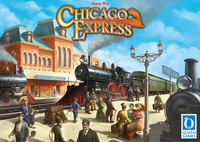
Chicago Express is neat, but I'm not buying a copy. I'm hoping Queen will translate it to Finnish and I can get it that way... Seriously though, while the new edition is pretty, I happen to like the Winsome edition, especially the fact that in the same space Chicago Express takes, I can fit four or five Winsome games.
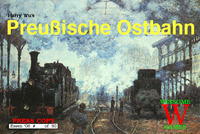
Preußische Ostbahn - The cousin of Wabash Cannonball. This is the German family game of the series, says John Bohrer, and I can tell you playing Ostbahn is more fun than playing Wabash. The games are similar, but different - how deep - in several, interesting ways. There are more companies, the share system is fairly simple, there's no stock dilution... And then there's the turn order.
As CortexBomb said in BoardGameGeek, Ostbahn is the turn order mechanism. Players get their cubes in a cup: the leader gets one, the second-best gets two, the next one gets three and so on. N cubes are drawn, where N is the number of players. The cubes tell who gets to play. It can get ugly, but then again, the goal of the game is to win without taking any actions...
This is a pretty rough game, and I need to play more to figure out how to work the stock market to my advantage the best. I've played three times and right now Ostbahn is the hottest game for me, the one I'd really like to play more. This is an excellent game.
I also enjoyed the other game in the Winsome Essen set, Gulf, Mobile & Ohio. I've only played it once, though, so can't say much about it yet. It's definitely the strangest game I've played in a while. I have to say I like what Winsome Games has done recently.
Of earlier Winsome games, I also bought Pampas Railroads from the reprint. I only played the game once, but I liked it and wouldn't mind playing more. It's a slightly longer game, so doesn't hit the table as easy.
Small comments: Steel Driver seems like a nice twist on the railroad theme, Steam over Holland is an exceptionally well-produced 18xx title, Le Havre has potential for excellence, but also for way too long sessions.
Good older games I haven't played before
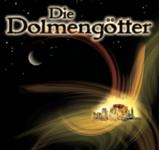
Die Dolmengötter - I skipped this one in Essen 2005 because it looked ugly and not very interesting. I shouldn't have, because it's one of the real highlights of 2008 for me. I bought my copy from Tommy, since JC Lawrence said nice things about in Geek and I wasn't disappointed. I even upped my rating to ten after some hesitation - the game is really, really good, but only with four players.
With four the game certainly nears perfection. It's 20 minutes of absolute bliss. Interesting tactical decisions, a hint of overall strategy and some luck or player interaction chaos - make sure you max out your highest dolmens and you're set for glory.
If I ever want an arts & crafts project, I might consider doing a nice-looking re-theming of Die Dolmengötter. The theme is completly bogus and the board is somewhat ugly - I think it could be nicer. I have no idea of a suitable theme, though.
Preference - A traditional card game. There are actually several similar games with the same name, usually identified by the country of origin. We play the Russian variation, which I believe is slightly more complicated than the more usual Austrian game. It's no Bridge, but a nice three-player game that is just challenging enough while being easy to teach - very easy, if the student has ever played a trick-taking game with bidding.
Preference also plays fast enough. It's a charming game and though it only works with three players, it's become a very likely choice if there are three players including me and Hannu and someone who doesn't hate traditional card games. This one's definitely worth trying if you're looking for a trick-taking game for three and want something more casual than Skat.
Tolstoy was a fan of the game. Oh, and when we play Preference, it looks just like in this painting by Viktor Vasnetsov. The archive copy of The PrefPage is probably the best source for rules in English, though it's slightly vague. Wikipedia has more.
Le Truc - This is another traditional card game that has gained local popularity. Ok, so Hannu likes it. Sid Sackson saw the greatness in this game and listed it in his A Gamut of Games. It is truly a great game. Very simple on the surface: three-card trick-taking with suits having no significance at all. However, the scoring system is where the game shines.
The possibility to raise the stakes mid-hand makes Le Truc work slightly like poker. Many elements are there: bluffing, slow-playing, going all-in. Le Truc is simple, but makes for a great two-player filler, since after all, everybody is carrying a 32-card pack with them all the time anyhow (what? You don't? I know I do). The game is best played in rubbers, at least the best two out of three, preferably even more, since there's plenty of luck involved and getting to know your opponent makes for a better game.
I should probably rate this one a ten, since I expect it has a good chance to stay in my standard repertoire for the rest of my life.

1825 - I went and bought the whole shebang - well, almost, I'm missing some expansions - in the Spring, the basic sets from BoardGameGeek marketplace and the rest from Leisure Games and Northumbria Games. I'm still missing the Phase 4 expansion, so if anybody has a spare copy, name your price.
I've only played three times - two two-player games of Unit 3, one three-player game of Unit 2 - which is a shame, but these longer games are hard to play. 1825 is just too long to fit comfortably in our weekly game nights. However, I can easily say this is my favourite 18xx game.
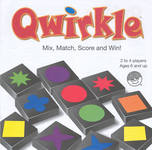
Qwirkle - Let's put Qwirkle here, even though the Finnish edition came out this year. Qwirkle is a really solid game: I rate it as eight, but I listed it on my Christmas Good Games list as the general recommendation (I list games I've reviewed and have various categories: for adults, for gamers, for families, whatever, and one general for everybody recommendation). This is a high honour, but I think Qwirkle deserves it.
Why? Qwirkle is simple, has enough luck and skill involved, looks nice, feels nice... It's non-offensive and perhaps a tad bland. I don't think many people are going to list it as their number one favourite, but I don't think many people hate it, either. It's an easy-going, fun game, with enough new and enough familiar. A solid game, with just one flaw - that's the score-keeping, which is somewhat clumsy.
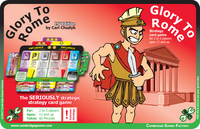
Glory to Rome - I finally ordered this from the States, thanks to cheap dollar and Brian Bankler's constant mentions of it. It didn't cost much, buying just this one game. It was well worth it, as the game is wicked fun. It's like Race for the Galaxy, but wilder... I like the ways the cards interact and how the combos can get outrageous. It's slightly tough game to teach and some people just don't like it - so, not an excellent game, but a definite keeper, I like it myself a lot.
Games I've kept on enjoying
Mahjong - I got back to mahjong this year, enough to do a mahjong web site in Finnish. That was - and is - a fun project, and something that was missing from the web. The site isn't tremendously popular (less than thousand visits a month these days), but at least the few visitors are really active with the Google ads.
I've played few games, experimenting with new rules instead of the good-old Japanese classical rules. I've tried the Chinese official rules, modern Japanese rules and the World Series of Mahjong rules. It's the WSoM rules I like the most, they are simple yet give the player enough options. I will play with just about any rules, though, as long as only the winner of the hand is paid. That's where I draw the line.
I also spent some quality time with Four Winds Mahjong, as I had to buy a Windows laptop to do my new job properly. They haven't released a new version, but the old one is still highly functional and an excellent tool for getting used to different mahjong rule sets.

Age of Steam - Good old Age of Steam. I managed to reach my goal of playing five games, but unfortunately didn't get any more in. For some reason Age of Steam is slightly difficult to get on the table. Well, I had fun with the few sessions I played, and got to try few new maps. Of course, I bought more maps than I played, so I'm still in trouble.
The Secret Blueprints of Steam maps intrigue me a lot. I tried them once, but the company wasn't the best possible - it just isn't a newbie-friendly way to play. I'd really like to try the blueprints with experienced players.
I also got to try New England Railways, an ancestor of Age of Steam. There are interesting differences and similarities, and while my opponents weren't excessively interested in this game, I found it rather charming.
Tarock - We've continued playing tarock - and it is definitely tarock we play, not tarocco or tarot, as we mostly play the Slovenian game with four and Strohmann with two. With three we play Preference, though Cego might be worth trying. We've only played Cego once, and that was with five if I remember correctly, and I get the feeling Cego is a three-player game.
The not-so-good, the disappointing, the plain bad
Eketorp - This game looks good, but it combines all sorts of elements I don't like. Double-guessing is the worst offender, and the fact that this game took 90 minutes to play. Eketorp looks great, but it looks like the mechanics don't really mesh with the majority of BoardGameGeeks: the game has just two 10s and nine 9s.
West Riding - I got something of a Winsome Games mania and purchased a set of Winsome Games when I found them at Northumbria Games. Of the three, West Riding was the disappointment. Dutch InterCity, an ancestor of West Riding in a way, is an odd game I've played only once, but it's a short game so I'd like to try it again at some point. West Riding, however, was kind of ok, but definitely not worth the three-hour play time. Were it in the same one hour slot as Wabash, it'd be another story. The third game of the bunch was New England Railways, which I already mentioned.
In the Year of the Dragon - This is a popular game, probably one of the more popular games amongst my friends I just can't stand. I've played this once on board and once on SpielByWeb and I don't want to play again. Something in this game rubs me the wrong way. It's kind of like Amun-Re - I can see why some people like it and I kind of think it's a pretty good game, but just not for me.
Animalia, Kingsburg, Airships, Thief of Baghdad - Meh.
Quick look on the good games of the previous report
Agricola - Five games this year. Requires will to get this on the table, and I'm slightly wary of playing the game with newbies. I would like to play more.
Caylus Magna Carta - Played once. Not a huge hit. Should probably sell this one. Magna Carta felt better than Caylus, but in practise isn't. In the end Magna Carta isn't short enough - were it more like San Juan, it would be better.
Combat Commander: Europe - Gone after few games. Too long, too fiddly, high resale value.
1960: Making of the President - Played once, sold. Not my cup of tea.
Phoenicia - Thinking about selling. Didn't play once in 2008, but I like it - then again, 2008 was the year of selling good games I just don't play (off went Memoir '44, Finstere Flure, Tigris & Euphrates, Combat Commander and several others).
Race for the Galaxy - I still like it a lot and I played it, too, but it wasn't quite the hit I expected. Hard to teach, too slow for my tastes with newbies, not a huge hit with the club.
Through the Ages - Bought the new edition, played it once, definitely not going anywhere (but I wished it got on the table).
Ubongo Extrem - Nice, but... one play of Extrem is all Ubongo I played this year. I like the games, but don't play them. Perhaps I should sell them, or sell the basic version and keep the Extrem, as I like it more.
Totals
Fives and dimes
Games played ten times or more in 2008:
- Dominion (28)
- Le Truc (14)
- Die Dolmengötter (11)
- Wabash Cannonball (10)
- Black Vienna (10)
These games were played five to nine times in 2008:
- Tier auf Tier (8)
- Race for the Galaxy (8)
- Qwirkle (7)
- Mahjong (7)
- Preference (6)
- Strohmann-Tarock (6)
- Set (6)
- Battle Line (6)
- Flix Mix (5)
- Bondtolva (5)
- Agricola (5)
- Age of Steam (5)
Pretty good lists, a lot more games than last year. I like these lists, I'm always happy when I get repeat plays for good games. Missing Age of Steam from these lists would've been a major disappointment.
Totals come to 284 games of 114 different titles.
Month metric
Top games on this list were Die Dolmengötter (six months) and Le Truc, Qwirkle and Preference (five months).
Year metric
- Battle Line (7/8)
- Attika (6/6)
- Gang of Four (6/6)
- Age of Steam (6/6)
- Modern Art (6/7)
- Lord of the Rings: The Confrontation (6/7) *
- San Juan (5/5)
- Ingenious (5/5)
- Lost Cities (6/8) *
I didn't play games marked with an asterisk this year.
Huber Happiness metric
Dominion, Mahjong, Age of Steam, Wabash Cannonball and 1825 brought the most Huber Happiness this year.
Continuing from the previous round...
Glory to Rome takes the spot as the hottest game of the quarter, by far: it has double the hotness points the second game on the list has. And why not? It's new and it's very, very good. I've played four games, once each with two, three, four and five players. All work, but five is a tad too long. Others are good; two-player game is slightly different, but I enjoyed that as well. This one's a keeper.
1825 Unit 3 has made its way on the table twice during the quarter, and is definitely worth a good spot on the list. It's a lovely game, just the right challenge for two rail gamers. The first time I played we used pen and paper (and calculators) for money, but I found the computerized system (a spreadsheet with automatically calculated totals) we used on the second time very helpful. With just two players, seeing the screen isn't a problem. For railroad fans looking for a two-player game, this is a good choice.
Die Dolmengötter came out of nowhere - a friend had it for sale, I had read pretty nice things about it from Geek, why not? - and turned out to be one of my new favourites. I've played two three-player games - enough to figure out four is the way to go. There just isn't enough with three, the co-operation aspect doesn't work well enough. So, that's a bit of a problem, but with a game this good, I'm not going to whine about it more: Die Dolmengötter with four is a really excellent little game.
Bondtolva is an easy two-player card game, with enough good stuff to make it interesting. It's a lovely option when Schnapsen is too much, yet you want something that requires a bit of thinking. It's one of my favourite two-player games.
Oh my, another quarter gone! The previous one was good, how about this one?
Wabash Cannonball is the hottest of the hot, and no wonder. I've loved every game so far. I'd like to try a five-player game at some point, to see how that changes the game. And of course more games with three and four! Fortunately the locals are in agreement about the excellence of the game. Right now, by the way, Finns have the highest average for Wabash at Geek.
I'm really interested in seeing how Wabash compares with Pampas Railroads (preorder, preorder, good people!). I'm such a fan of short and action-packed games that Pampas needs to be really good to stand up to Wabash. We'll see...
Black Vienna - After my visit to Jyväskylä, it's no wonder Black Vienna is on this list. We had some really good time with this game, and I'm taking the game with me next time I go (unless they've done their own copy, which is likely). On the other hand, I'm not sure I'm that interested in playing this game elsewhere.
Race for the Galaxy is an obvious addition to the list. Seven more games, and I want more. This hasn't been a huge hit, but to me this is still the top of 2007, despite Wabash.
Cuba makes it to the list after three games. It's unlikely to appear again, but we'll see.
One of my pet projects has been to create a metric to measure my success in various games. I'm not satisfied with the obvious choices: sheer number of victories means the games I've played a lot are on the top, despite the winning percentage, while winning percentage alone lifts the "one win of one game played" games on the top. Not good.
My previous method was pretty good, but still lifted Lost Cities high on the top. I've won Lost Cities 68 times, but 68 out of 112 in a two-player game isn't a record I'd advertise a lot. I'd rather see Sunda to Sahul (18 wins of 21 games) on top, for example.
Well, here's the latest take on the success metric:
Success = (Number of wins - Expected wins) * Winning percentage
That's it. Expected wins means 0.5 for a two-player game, 0.33 for a three-player game, 0.25 for a four-player game and so on - the expected result, if winning the game was based on pure luck. Winning percentage is put on a scale from -1 to 1 and as the first part of the calculation can be negative, there's some fuddling to make sure it stays that way even if the winning percentage is negative as well.
That works, pretty well. There's some oddness to it (for one, if you play a game with two, three and four players and win once, it doesn't matter which one you win even though it probably should), yet I find the results fairly satisfying.
And here's the one final bit of trivia for 2007, the hot games for Q4. Shouldn't be any surprises in store, but it's good to have this one link in the chain of quarterly reports! Goodness continued from the previous quarter as the Thursday games were still in.
Agricola is hands down the hottest game of the quarter. I put in extra effort to get it on the table many times and succeeded quite well. One personal triumph was the three games I played with Johanna. I'm very glad of that, and she did enjoy the game quite a bit. My mother also enjoyed the game we played at Jyväskylä.
Race for the Galaxy was the other game that got many playings: eight like Agricola, though those eight games took a lot less time, as they included three rather fast games. Hopefully the fast games will prevail over the 45-minute ones.
Slovenian Tarok - My tarot-playing friends love the Slovenian game, so that's what we played. I wouldn't have minded if some of those games would've been games of the Hungarian game, but I did have a blast playing Slovenian, so I don't really care. Tarot is good.
These three games dominated the quarter: Agricola in particular was played so much that other games were left in its shadow.
I've been a fan of Matthew Gray's month metric. Now I happened unto his Every year 2007 update, focusing on the year metric. I haven't been bothering with that, believing I wouldn't have many high-scoring games. Well, I thought, why not - it's a simple thing to add to my game stats package.
I was surprised to see I actually have few every year games, going for several years now. I'm positively dumbfounded.
Six years out of six
Go - Face to face it only gets four out of six, but I've been playing it constantly online (play-by-web, which doesn't get captured in my stats).
Lord of the Rings: The Confrontation - First four years basic, last two Deluxe. I'm a bit surprised here (and probably should get this one on the table this year, at least once!).
Six years out of seven
Battle Line - One game in 2005, 2004, twice in 2006.
Lost Cities - Once in 2006, twice in 2005 and 2004.
Five years out of five
Age of Steam - Last game of standard Age of Steam was in 2003, expansions since. Steady pace of few games per year. Likely to continue: even though I really suck at getting Age of Steam played (particularly considering the pace of new expansions), it'll be strange if I don't play it even once.
Attika - Few games a year, for five years now. Surprising.
Gang of Four - Lots of this in 2003 and 2004, less since, yet still every year. Likely to continue, as this gets probably played at least once a year when I'm visiting Jyväskylä.
Five years out of six or seven
Modern Art - This inspired me to add the code so I could check sessions by game, because I just can't believe it. But it's true: once in 2002, once in 2003, then twice in 2005, once in 2006 and twice in 2007 with my own copy.
Puerto Rico - No surprises here, I missed last year. As the game's no longer available at BSW and I kind of prefer San Juan face to face, misses like that are likely to happen again.
Samurai - Few games every now and then, starting from 2001.
Tichu - Very irregularly over a long period.
Tigris & Euphrates - Most of this was in 2001, but I've played it occasionally ever since. Missed last year and 2005.
Trivial Pursuit - Not a single game last year and missing 2003 as well, but fairly regular play since 2001 with Johanna secures the spot on the list.
Web of Power - Tons of this in 2002, then slow dwindling and missed last year.
This is a good list and like Matthew Gray says, a good measure of quality and longevity, especially when you get plenty of data (Matthew Gray has eleven years, I only have seven).
Another year of games is soon over. Gaming year 2006 was good, but I think this one was even better! At least in quality, not necessarily in quantity...
Good new games (2006-2007 games)
Agricola - This year brought two very good games, worthy of top-10 or even top-5 spot on my personal ratings. Agricola is one of them. It's just that good. After my first games, I thought I'd buy the game when the English edition comes out, but then I figured out I want instant gratification, I'm not waiting for who knows how long (at that point the English edition wasn't announced yet). I just had to get the game so I could play it, and I haven't regretted that decision.
So far I've played the game with two, four and five players; I like them all. With five, the game gets a tad long, so I'd probably prefer the game with up to four players. Two is easier and softer; an excellent choice to play with my wife.
I've tried the advanced game once, so far, and I'm actually rather happy with the family game. It's a real game, with nothing missing - the cards just add extra on the top. There's plenty of hype around Agricola, but it's just about worth it. I think W. Eric Martin had a good point about Agricola when he said it's a really neat mixture of an experience game (strong, if somewhat nonsensical theme) and an engine game (clean, sleek game mechanics). I think most people who like euro games will at least like Agricola; it's certainly worth a try.
Caylus Magna Carta - Original Caylus was a good game. I liked it, but eventually realized I don't want to play it that much, for some reason. Part of that was the length of the game: Caylus tends to drag a bit with four or five players. Enter Magna Carta: a shorter version with random elements included. Exactly what I wanted! It turns out Magna Carta isn't the hottest thing either, as I've only played it five times so far.
Magna Carta isn't quite as short as one might think, that's one thing for sure. It's no fifteen-minute filler. I don't know; in any case, I believe replacing Caylus with Magna Carta was the correct decision.
Combat Commander: Europe - I was rather thrilled about this one earlier in the year. It was certainly one of my bigger crushes on board games so far. I was devouring information about the game before I got it. Then I got it and pffft, it fell flat. Well, not quite: I did play the game solo and took some time to get in some real games as well. It's good, but not great. The problem with CC:E is a lower density of meaningful decisions, compared to some of the better euro games. That, and the fact that playing a three-hour two-player game is just darn tricky. I'd like to play this more, as I think getting some practise would make the game a tad faster and more enjoyable, but that would require too much time right now and a regular opponent, as well.
So, I'd say this one still has some expectations to fulfill, I'm certainly not going to buy any expansions, but I'm not selling this either. I know I have that heavy war gaming thing at some level, and this is what I'm going to use to satisfy that need. I'm fairly confident that I'd end up regretting selling this one at some point.
1960: The Making of the President - This one came so late I only played it once. I want more. It's a good game, just a tad too long perhaps. Well, long enough to make playing it somewhat tricky (see Combat Commander). Still, it's another good card-driven game and I like the theme and the whole graphic design thing they have going on here: 1960 looks sweet and works well.
Phoenicia - The other Tom Lehmann game. This game sounded pretty great, I mean, Zavandor had some serious issues and Phoenicia just seemed to fix them. That was my feeling based on the previews on Boardgame News and it turned out I was right. Well, Phoenicia has some issues as well, but nothing major. The biggest problems the game has are related to the graphic design, not game design, I think. I like the game and I'm happy I got to play ten games (few at JKLM Interactive, rest face-to-face).
Race for the Galaxy - This is both the other Lehmann game and the other my-god-this-is-great game. This one was no surprise at all, after the previews and Brian Bankler's comments. I was rather confident that I'd like this and indeed I did. This is just so close to perfection: plenty of variety, clever mechanics, fast gameplay, science fiction theme... It's just everything I want, in one very tidy package. The only problem is the other players: this isn't the most newbie-friendly game and people do take their time playing this, resulting in 45-minute games. Were it up to me, this would be a 15-minute game (I've had some of that, and
we're talking about serious game-induced nirvana there). Just like San Juan, only so much better...
Through the Ages - I only had one opportunity to play the game this year and that was a fairly quick two-player game, but it left me wanting more. A lot more. I think I'll have to buy this, unless they really screw up the new edition.
Ubongo Extrem - Makes Ubongo even more interesting. I thought Ubongo had a good scoring method, but then I played Extrem and saw the light. The new scoring method strikes a remarkably good balance between skill and luck and keeps it simple at the same time. And while we're talking about Ubongo, Mini is a pretty nifty five-minute filler.
Yspahan - After missing Yspahan last year, I finally tried the computer game and ended up playing, what, fifty games. Since after all those games I still enjoyed it, I thought I'd better grab the board game. I think I played the board game twice, but hey, it isn't going anywhere (unlike the PC game - this year I went all Mac and can't play the computer version anymore).
Good older games I haven't played before
Fairy Tale - I had played this once before but I really caught this this Fall. It became something of a staple in our Thursday games, as most folks who've attended few times know it for some reason. Especially earlier we played this just about every Thursday. And why not? It's an excellent game that plays in 15 minutes. It's reliable, almost like clockwork. Brilliant game, though explaining the rules is remarkably less fun than playing the game...
Kuhhandel - I found this classic auction game now, perhaps just a bit late to the party. Iain Cheyne has been a supporter, so I wanted to give this one a shot and it was well worth it. Not everybody was as enthusiastic about this one, but I thought the game was quite neat. Played with a speed-up variant of auctioning two animals at the same time it's almost a filler, yet quite meaty.
Tarot - We've played quite a few different card games because of my book project, but none hit like Tarot. For some reason it's the Slovenian Tarok that has made the strongest impression. Then again, why not? It's a good game with an interesting bidding mechanism, some good challenges in play and lots of fun. Like Hannu, one of the biggest Tarot fans in our group, said: Slovenian is one of those games where you just have so much fun, no matter if you win or lose - and often losing badly is most fun.
Other good Tarot games include the Hungarian Tarokk and the Bolognese Ottocento - I haven't tried French Tarot, the just about only living and growing Tarot game yet, and frankly, I don't know if I will since the Slovenian game is somewhat similar yet more interesting.
Xiangqi - I took up Chinese and Japanese Chess late this year. After playing some of both, I think I prefer Xiangqi, the Chinese game. It's more dynamic and exciting. I do like the drops in Shogi, but other than that, Xiangqi is more interesting and - perhaps - less Chess-like. Shogi's a tad dry. I'm playing both at BrainKing. And let me join the chorus: learning the Japanese or Chinese symbols on the pieces isn't really that hard.
Games I've kept on enjoying
Age of Steam - A ton of expansions, again, but just four plays this year. Because of all the new games, Age of Steam just doesn't get on the table. I'm also a bit wary, expect it to take more than two hours and that always makes games hard to play. I should be able to play Age of Steam on Thursday nights. I need to make more effort to get AoS on table!
Blue Moon City - Got five plays this year, which was nice. Most of them were pleasantly tight and exciting like Blue Moon City usually is.
Most of my playing was new games - so many good new games this year, it seems. There were plenty of really good older games I didn't touch once. The number of games I played was reduced a lot from before, and here it shows. Older games suffered under the new games, especially as there were plenty of games I wanted to play a lot (Tarot, Race for the Galaxy, Agricola particularly).
The not-so-good, the disappointing, the plain bad
This section surprised me: I've been able to completely avoid really bad games. Hooray!
Chinese Poker - After playing, what, dozen hands of this, I finally realized there's really very little game in this little time-waster. I'm really surprised many Poker pros like this game so much.
Space Dealer - By far the biggest disappointment of the year. The concept was so darn cool, so like it was made for me. Science fiction theme, time pressure, real-time play... Bah. Like I wrote in March, I had time to send my wife text messages while we were playing. It was that intense. The game felt stale, the rules were muddy, the whole thing was such a disappointment. Fortunately I got the game I wanted in Race for the Galaxy, but I had really high hopes for Space Dealer, the concept sounded just that great.
Totals
86 different games. A lot less than last year (it was 123 last year), but then again, last year I felt I had actually played too many different games. I've tried to cut down getting uninteresting review copies, that helps a bit.
Total number of games played fell from 379 to 193 - that's a major drop and perhaps Nooa starts to show up there a bit. There's also some bad luck: I missed almost all board game club sessions this Fall. Fortunately I was able to have the Thursday sessions, but that's often only three or four games each week.
Fives and dimes
These are the games I played ten times or more (even shorter than last year and less intense, but I didn't have time for BSW games this year):
- Fairy Tale (19)
- Phoenicia (10)
These games I played 5-9 times:
- Agricola (8)
- Race for the Galaxy (8)
- Slovenian Tarok (8)
- Combat Commander: Europe (6)
- Blue Moon City (5)
- Caylus Magna Carta (5)
The lists are shorter, much shorter than last year...
Month Metric
Tarot, Fairy Tale and Age of Steam got played during several months.
Huber Happiness Product
Biggest sources of Huber happiness in 2007 were Tarot, Agricola and Combat Commander: Europe. This is remarkably unsurprising metric.
It has been a good quarter. With the new Thursday sessions I've had time to play more games, which is always good. I even made it to the Board Game Club.
Previous quarter was a good one, too.
Fairy Tale is definitely the hottest game, with 13 games played and thoroughly enjoyed. It's certainly my number one filler right now. What a great, great game. I still suck in it, though, I have won exactly one non-partnership game.
Slovenian Tarok is another hot newcomer. I've fallen in love with the Tarot games, and the Slovenian is my favourite so far. There's room for skillful play, interesting fluid partnerships and - I have to admit - the cards add some extra charm as well. If you're looking for a skillful trick-taking game that works with both three and four players and is fairly easy to learn, this is a good choice.
Portobello Market is pretty neat and quite a good choice for a light family game. I did enjoy it, and I like the way it plays real fast, but I'm also pretty much done with it.
Age of Steam got few plays, which means I have few less unplayed expansions. This just tickles me right: the combination of familiar and very enjoyable mechanics with the new expansions satisfy both my need to play the same good games again and again and my need to try new games.
Yspahan became a board game for me: I haven't really played the PC version, now my wife got a new laptop and I've been able to use our old PowerBook all the time. It's very good that way, too, and definitely one of the highlights of the year.
Phoenicia is another highlight. I like this one a lot, I do! The balance seems pretty good, and I like how you can do pretty well without having the best income.
After a very slow quarter, I'm back with a bit more action.
Phoenicia rules the list, after five online games. It's good, and I'll buy it as soon as it appears in Finland.
Caylus Magna Carta - forget the board game, the card game has all the Caylus you'll need and it's packed in a very neat and tidy timeframe. If the board game takes 30 minutes per player, this is 15 and probably less with experience. I've played three games now and I'll love it!
Zooloretto - Good, worth the SdJ, I will play again if an opportunity comes up, but I don't need to own this.
Blue Moon City - Excellent game. Now I've played with 2, 3 and 4 players - it works well with all numbers. Wonderful game, and the last few games have revealed more depth in the decisionmaking. I'm glad I bought this.
Yspahan - Of course, I need to mention this one. I've played over 50 games with the PC version and I just bought the board game. What an excellent game. Review coming up!
This was a pretty quiet quarter, with basically one hot game and bunch of other games with just one play each.
Previous quarter was a tad more active.
Combat Commander: Europe - The obvious one. I was enthusiastic, but now I'm a bit less so. Strong eight, still, but I'm really coming to think that war games aren't perhaps my thing after all. Lots of rules, yet the game is in the end not particularly challenging. That is, there are games that pack more punch to shorter timeframe and less complicated rules. The narrative aspect doesn't do it for me enough, I suppose. Still, I like this, but I don't think I'm going to buy every CC game in the system. Maybe CC:Med, but I'm not even sure about that.
